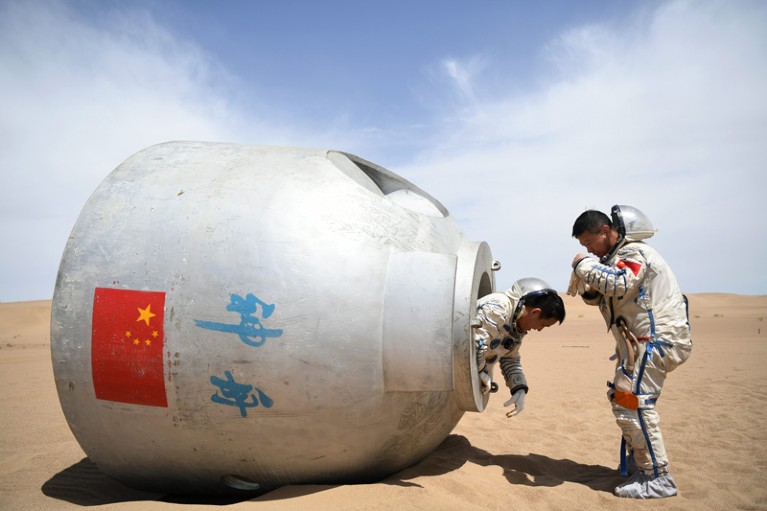Hello Nature readers, would you like to get this Briefing in your inbox free every day? Sign up here.

Chinese astronauts are scheduled to have their own major space station from 2022.Credit: Chen Bin/Xinhua/Zuma
China reveals space-station experiments
Nine scientific experiments have been selected out of 42 hopefuls to fly onboard China’s first major space station, scheduled to be completed in 2022. The projects from teams around the world will probe how DNA mutates in space, fluid and fire behaviour, biology and astronomy. If the United States sticks to its plan to cut funding for the International Space Station, the China Space Station could be scientists’ only laboratory in low Earth orbit from 2024.
Academics join outcry in Hong Kong
After more than a week of huge protests in Hong Kong, the government there has suspended its contentious bill that would legalize extradition from Hong Kong to mainland China. But the protests have continued, with critics demanding the bill be withdrawn. More than 1,000 academics from around the world have signed a petition amid concerns that the law would erode personal freedoms and stifle academic debate.
The evolution of puppy dog eyes
All dogs have an eyebrow muscle that wolves don’t, which helps them make the ‘puppy dog eyes’ expression. The longing look triggers warm fuzzies in both humans and pups through the ‘love hormone’ oxytocin. The finding is evidence that domestication transformed the facial muscle anatomy of dogs specifically for facial communication with humans, say researchers.
FEATURES & OPINION
Stress, long hours hobble science careers
Career paths are becoming ever-more precarious. The age at which researchers obtain a permanent position — if they do at all — is rising ever higher, and research that was until quite recently considered ‘excellent’ is now the bare minimum expected. Those are the sobering findings of a survey conducted last year of members of the Young Academy of Europe (YAE), a pan-European network of early-career researchers. The YAE is calling for policies to support up-and-coming scientists, such as realistically calculated work hours.
A path to climate consensus
Eleven diverse specialists came together to discuss one of the most controversial questions in the study of interactions between the climate system and human society: Will the risk of armed conflict increase in a warmer world? The moderated 3-day discussion was an example of ‘expert elicitation’, a way to generate a synthesis of the evidence and the specialists’ often conflicting views. The group’s conclusion was not Earth-shattering — climate change has already increased the risk of armed conflict, but the effect is small relative to the effects of other factors. The deeper importance of the work, argues a Nature editorial, lies in the approach, and in the recognition that common ground, however modest, can emerge from diverse and opposing lines of evidence.
Death in the dust
Valley fever is a potentially deadly fungal infection caused by Coccidioidomycosis spores that are borne on the wind. Years of climate change-fuelled drought seems to be contributing to a rise in cases in the southwestern United States — and the people who grow the food for America’s tables are bearing the brunt of the risk. Civil Eats explores how a perfect storm of dust exposure, long hours, extreme heat, a lack of access to health care, immigration issues and poverty is affecting the farm workers of California’s Central Valley.
